Following up on James Bacon’s review of Earth 616, David Thorpe’s autobiographical work, it will be apparent to readers that there was a difficulty surrounding the portrayal of the Troubles in Northern Ireland in Captain Britain in 1982. Alan Davis and David Thorpe have spoken of this over the years and, historically, it is interesting to consider now, while remembering for ourselves that things were different in 1982. James Bacon delves further…
“Captain Britain” was created in 1976 by Chris Claremont, originally from north of London, and Herb Trimpe, who was resident in the UK at the time. The strip first ran in the Marvel UK publication, Captain Britain for 39 issues on a weekly basis, the first issue cover dated 13th October 1976, the last dated 6th July 1977, then continuing in Super Spider-Man.
Comics are a canvas, and often one that is worldwide in scope. Ireland, Irish characters and Irish politics have appeared in US comics since the 1940s. World politics is ably exemplified in the amount of war comics that existed during World War Two, and at times superheroes have gotten involved in more local issues. This was selective: Stan Lee had previously made it clear that there was no official stance on the Vietnam War and characters that did find themselves in Vietnam such as Iron Man or Captain America were there briefly, and did not significantly engage in that issue of the day.
Captain America did disown his title and uniform, in protest at the Government in a storyline by Steve Engleheart. This began in Captain America #169, and Steve Englehart spoke to George Marston at Newsarama, recalling:
“I was reacting to Watergate… then-President Richard Nixon ordered his people to break into the Democratic headquarters and steal stuff, and they got caught … the thought that the president of the United States could commit such a crime was unthinkable.It was like a political thriller in real life, I thought to myself, ‘This guy knows he’s guilty, and he knows they’re gonna get him.’ So Watergate just engulfed everything, and I’m writing Captain America, which is supposed to take place in the same America – everyone lives in the “real” New York City. I thought there was no way Captain America could just keep fighting the Yellow Claw with that going on. And some of it was just hubris and luck – they could have convicted Nixon the next day and I would have been writing a story about something that was already over with. But it looked like it was going on for a while, so I capitalised on that.”
Epic Illustrated was aimed at the adult market and its April 1981 issue #5 featured the very stylised drawn “Rising of the Moon” by Bill Mantlo and Polly Law, a futuristic 2079 six-page story of Greater Britain and Irish prisoners on the Moon, reflecting on the troubles at the time. Epic Illustrated was, however, far removed from the Marvel UK publication Marvel Super-Heroes, which reprinted Marvel stories in Britain.
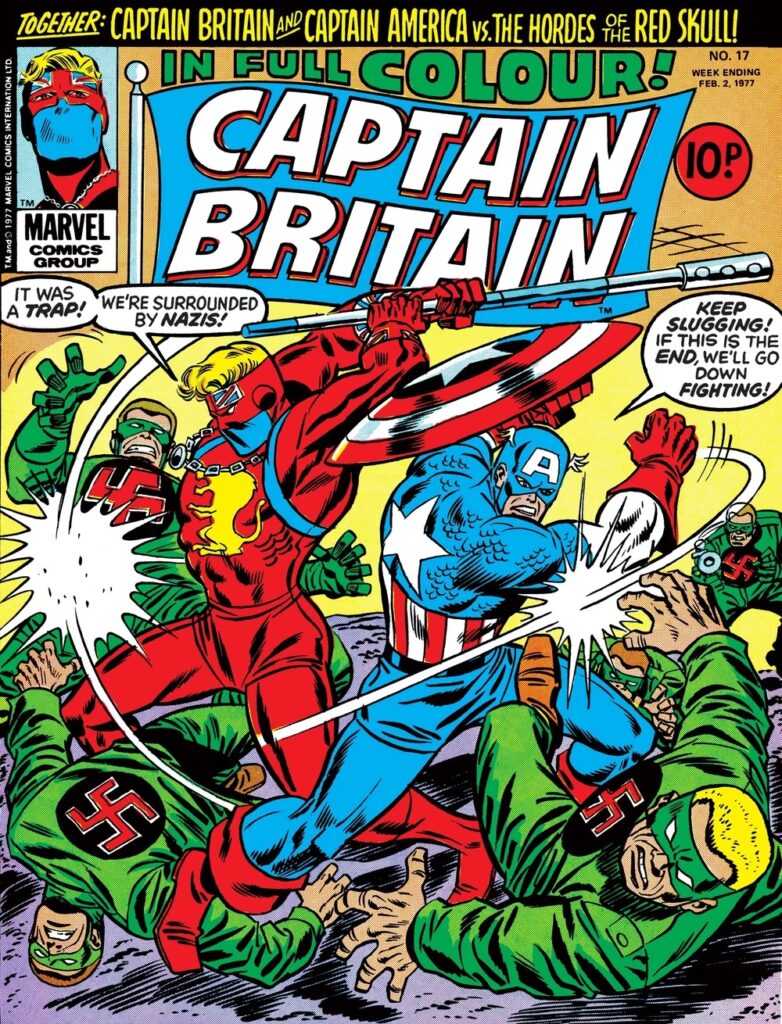
David Thorpe was a fan of Captain Britain long before he came to write for the character. It is possibly no surprise that a person who was broadly aware of matters around him, a progressive who had studied Dada and Surrealism in university, had an interesting idea in his early twenties as outlined in this reader’s letter from Captain Britain #17, from February 1977:
NO POLITICS
“Dear Neil and Co
Captain Britain. When I first heard the name I thought. “Oh no! British Superheroes great! But a Captain BRITAIN! However, I have waited to see the first live issues before writing to tell you how I feel about it. Alas, my initial fears have not been altogether dispelled. but although I’m not really happy with Captain Britain I understand that you could not have begun to introduce All-British heroes to the great British public in any other way.
Marvel started in the States with story about a college kid who, by some accident, got bitten by the hero bug (sorry!), had secret identity problems, as a student was picked on by his fellow students, had a special relationship with his science teacher, etc etc That was Spiderman, and now Bran Braddock is get-ting the same treatment. Right down to the appeal to a lower age group, which also particularly characterised the early issues of MWOM and SMCW (all have puzzle pages for kids). It’s a safe formula and it works. At least I hope it does. because if it does then it means we can progress to further British heroes. perhaps written by an all-British Bullpen, and perhaps treat them in more adventurous less formula-ridden way.
I may get to like Cap Britain a bit more, perhaps when you feel you can slow the all- action pace down a bit, and have ‘young Braddock’ thinking about what it means to be a ‘Captain Britain’. After all his American counterpart got to thinking exactly that way, and it was highly enjoyable reading. No need to make our Cap political (heaven forbid!) Steve Rogers was never political he always adopted a humane, reasonable and concerned attitude to what his country was at. So the intriguing questions I keep asking myself are. “where would Captain Britain stand on the Northern Ireland question?” (touchy,) or even devolution. Hope we’ll find out some day!
Meantime, thanks a zillion for the full colour! For bringing in Captain Britain at all! And for being Marvel anyway! Best of transatlantic luck for the future!
Dave Thorpe, The Square, Scorton, Nr Garstang, Lancs
The editorial response was as follows:
“We read you. Dave. You want Captain Britain to develop into a thinking man and you want more like him. Well here’s a coincidence… so do we! So the chances couldn’t look brighter.”
David Thorpe went from fan to pro, seeking work for Marvel in New York and then gaining employment working for Marvel UK as an art and editorial assistant in their London offices for Paul Neary in 1981. After a time, he was informed by Paul that he would be writing “Captain Britain”, with art by Alan Davis on the monthly Marvel Superheroes. This was a big break, a really fortuitous moment, and both of them saw the opportunity.
Thorpe wrote nine episodes of “Captain Britain”, starting in issue #377 of Marvel Super-Heroes cover dated September 1981, the story picking up from the end of “The Black Knight” strip in Hulk Weekly, through to issue issue #384. Paul Neary wrote the story in Issue #385 and and then David’s run on the strip came to an end with #386.
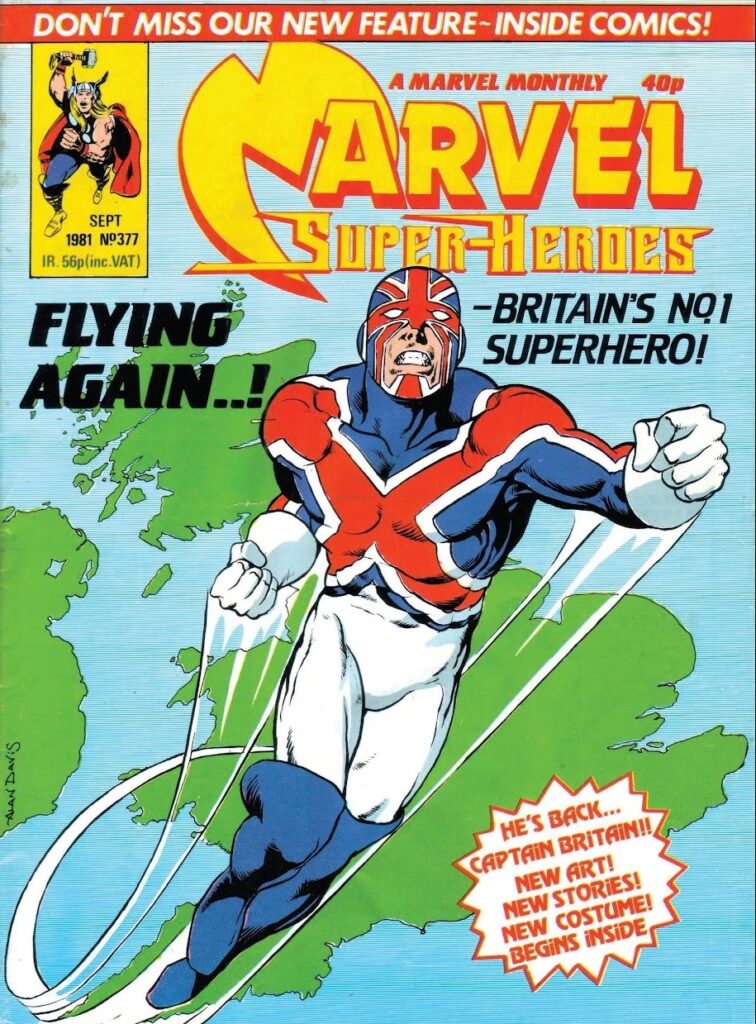
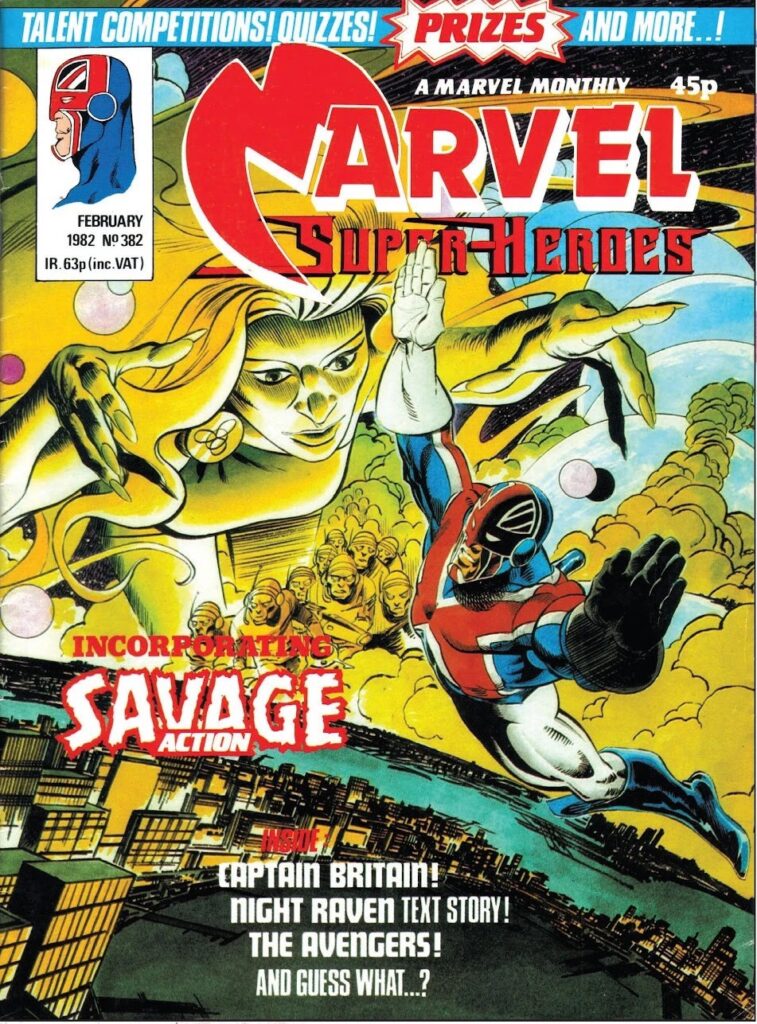
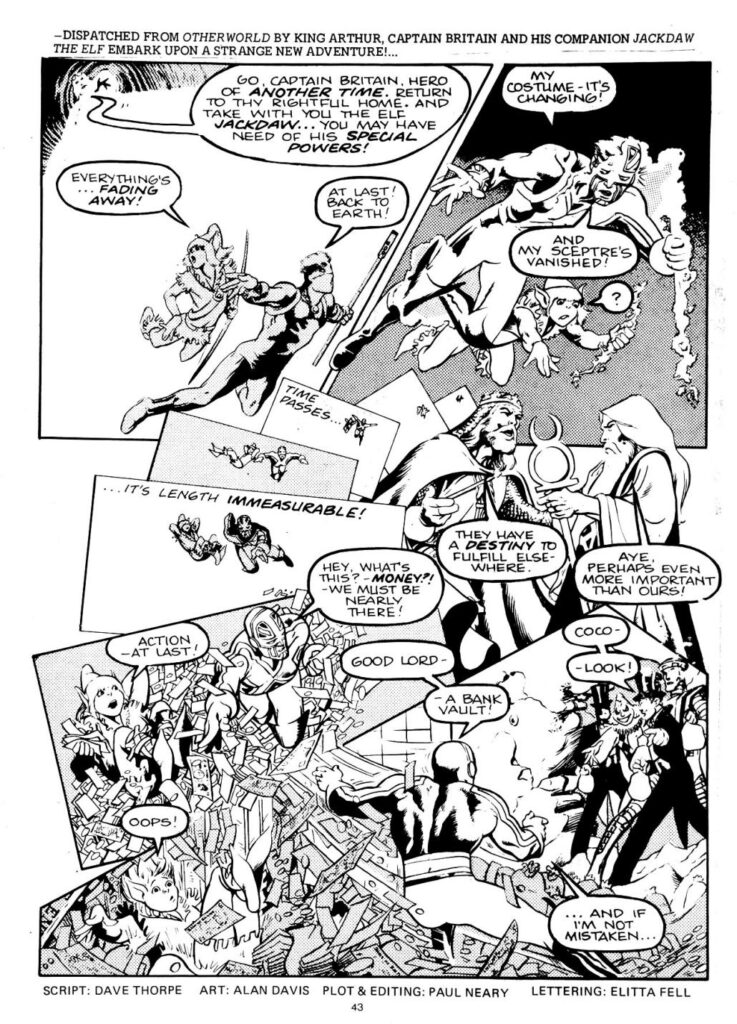
This was a difficult time in history for Ireland. The Troubles had been ongoing since 1969. In 1981 there were 114 deaths related to the troubles, including children and civilians. The hunger strikes that saw Bobby Sands elected as an MP, came to an end in October 1981. In 1982, 111 people were killed, including an 11 year old. It was a terrible and brutal time.
Thorpe notes in his book, Earth 616, that after he had been working on “Captain Britain” for a while that “one of the readers with long memories and too much time on their hands wrote in to ask if I was the same Dave Thorpe who had once written a letter to the original Captain Britain comic, wondering what he would have thought of the Northern Ireland conflict. I had completely forgotten about this. Ever anxious to please readers I took this to mean that readers wanted to read more stories connected to current affairs – modern Britain.”
A catalyst that he regrets.
Looking at issue #381 of Marvel Super-Heroes, it contains a number of letters and while there is critique and consistently there is a demand for more than six pages for Captain Britain, two letters say as follows:
“Script, well Dave Thorpe, one time reader and letter writer, you wanted Cap to think about what it means to be Captain Britain, I hope you don’t forget this” wrote Steve Poland from London.
“Dave, after having written a letter (in CB 17) explaining what you would like done with the strip, why haven’t you done it?” said Timothy Nelson from Essex
In this same issue, David is given a column and replies to the letters, and it is a reasoned and nice reply. He also mentions the Englehart Captain America, and notes in regard to the length that “It encourages us to do something different from what the Americans do, with their Super-heroes and 22 pages. And of necessity, it makes everything we do controversial because it is not what the readers expect. This is obvious from the way several letter writers berate me for apparently not doing with CB what I said I would do five years ago.”
David continues: “Two points here; firstly I’m not the same person I was than, Secondly, I think these people are looking for the wrong things. One of the high points for me of Marvel in the 70’s was Steve Englehart’s stint on Captain America, where he made Cap question his role in an America riddled by corruption. If you expect something like that kind of treatment with Captain Britain, you’re going to looking the wrong way. Yes, we’re going to explore all those issues, but as an integral part of the action in the storyline, using the themes inherent in the support characters’ situation. The Alternative England that Cap’s in now can be seen as allegorical to our. It is a nightmare society. This extremity allows us to throw the status of Captain Britain into sharp relief.” the column continues as we see a patient and thoughtful Thorpe share his approach with Captain Britain. At this stage there is no explicit mention of Northern Ireland, but it is obvious what is being spoken about by readers.
In 2009, David wrote an introduction to Captain Britain Volume 4. He said:
“I figured this reader and therefore others wanted to see such a story and drafted one which made reference to the conflict in Northern Ireland – then spilling over to a bombing campaign on the mainland – trying to avoid favouring one side or the other. I wanted it to sympathise with kids living there caught up in the conflict. It revolved around a sad, true story, which seemed to epitomise the tragedy of the province, of two children who had met and become friends while away on holiday. But when they returned home to Belfast they realised that they came from opposite sides of the divide — one Protestant and the other Catholic. So when one visited the other’s neighbourhood he was attacked. Captain Britain, flying overhead, on a mission that was part of the overarching storyline, noticed this and came down to break up the fight. That was the sum of it. I naively felt that as this was an alternative world we could play around with it without risking offending people. Boy, was I wrong.”
I asked David for some more details and he said: “there was definitely mention of Protestant and Catholic communities. The boy and girl who I think I named after friends of mine, Jeff and Sharon, in the story they met on holiday and became friends. They did not know they were from different religious communities when this happened. Then, when Jeff came to visit Sharon after the holidays in a suburb of Belfast, he was attacked by Protestant youths. Captain Britain happened to be flying overhead and saw the dispute and came down to intervene, with the aim of making peace. He was himself attacked by Catholics because he was wearing the union jack on his costume. I had hoped that such an innocuous story would not cause offence. I was not coming down on the one side or another.”
This was the original story idea, which would have been over two issues, so really a matter of ten or twelve pages. Yet in the words of Sir Humphrey Appleby: “That’s very brave of you, minister. An extremely courageous decision.”
David Thorpe said in his book: “First of all, Alan Davis, who lived in Corby where there was an Orange (Protestant) population, refused to draw it.”
It is true that Alan did not want to draw the story, but the reasoning is at odds with Alan Davis’s account, and one I was unsure of given his dedication in a later issue of Excalibur, when the team were in Sligo.
There may have been a lack of clarity of understanding between both men over this contentious matter, and it is possible they have not actually spoken about this to each other.
Thorpe explained further in response to a recent query “… I assumed many of his friends were Protestants and he did not wish to offend them.”
In Speakeasy #47 Alan said: “Dave … started to direct the strip towards a more politically motivated and comment based storyline. I disagreed with this, as did the then current Editor (Bernie Jaye) , The crux came over a proposed sequence dealing with the situation in Northern Ireland”.
David adjusted the story, “In response, to soften it, inspired by Swift’s Gulliver’s Travels, I changed it into an allegory and made the names into anagrams –– e.g., Belfast became Fablest. “
This was a parody story, and Alan Davis makes mention of it in the Twomorrows Modern Masters Volume 1 where he said ” Belfast became Fablest, Protestants became Rottenpasts and the Catholics became Coalitches. The Rottenpasts were orange growers and Coalitches were potato growers. This is when I got angry because I was insulted that anyone might think I couldn’t see through something so transparent.” He continues: “I was quite prepared to walk away and never work in comics again than draw the story the way it was.”
In the story, we have the Rotties and the Coalies, standing for protestants and Catholics.
Here is some of the script reprinted in Speakeasy #47:
- On a hillside not far away, with Jeff and Sharon huddled together for warmth, Sharon explains the situation to C.B.
Caption: On a nearby hillside, just outside the small city of Fablest, Sharon explains the situation to a curious Captain Britain…
C.B.: But this island is part of Britain isn’t it.
Sharon: see… Oh, yes, but there’s a civil war going on you
- Illustration of two factions, dressed in appropriate military guerilla uniforms, engaged in high battle in an urban environment. Explosions, gunfire etc. Presence tanks, jeeps, fires in property. Injured. of
Sharon (voice over):… between the Rotties and Coalies. It’s been like this for sixty years.
CB: (voice off): But what’s it about?
- The only thing I can think of to put in this picture apart from a pic of Jeff & Sharon is a man holding an orange bush trying to persuade another man to take it while he disagrees and behind him is a field of potatoes. Yes I think that’ll be OK!
Sharon: (voice over): The Rotties believe that the land on the island should be used only for growing potatoes like it’s always been
Jeff (voice over): to grow oranges. but the Coalies think it should be used
Sharon: They were introduced by the Dutch.
- The farmer has snatched the orange tree from the other fellow & broken it over his knee in rage, much to the anger of the latter.
Sharon (voice over): And the British Government agree with them.
CB (voice off): Is that all they’re fighting about?
Sharon (voice over): Well, yes, Apart from the fact they just hate each other.
(End script excerpt)
This iteration of the story was not acceptable to Alan Davis either, but there was a further issue at hand. Bernie Jaye, who was the editor was an employee of the Babani Brothers who effectively owned the rights to Marvel UK publications, also had concerns.
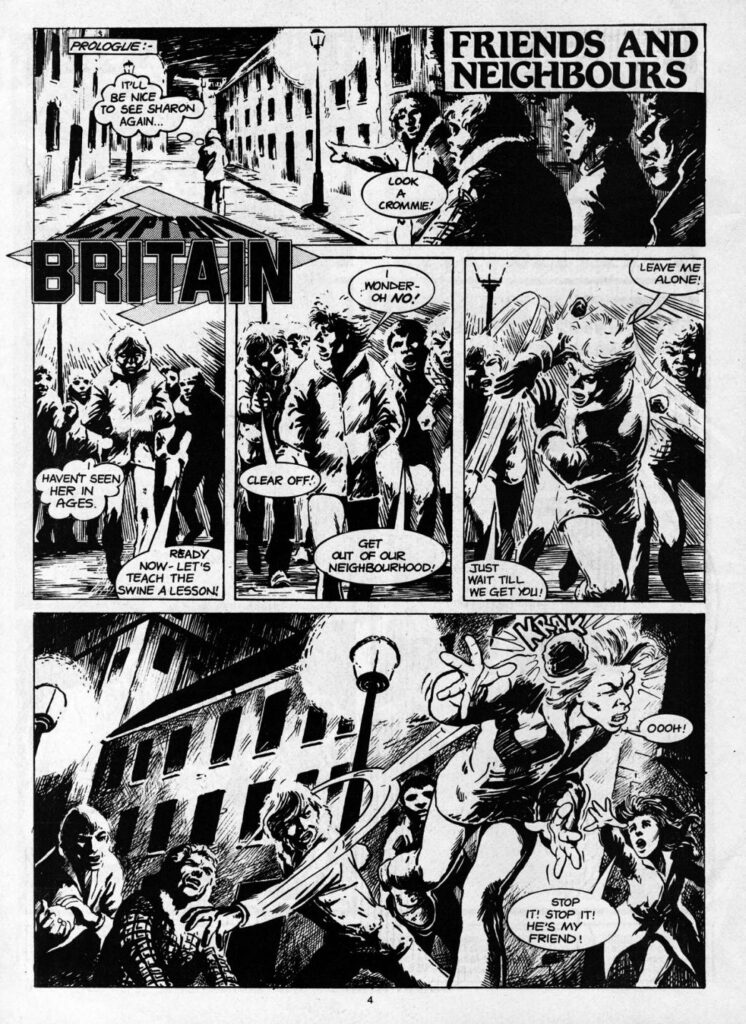
Bernie Jaye took over editing Captain Britain after Paul Neary left and spoke about the strip in Speakeasy #91 October 1988. “The strip was originally born into quite a hostile environment and I was very aware of this when I took it over. Brian Babari, the managing director of Marvel UK at the time, made it clear that it made no economic sense for Marvel UK to originate its own superhero material. He felt that we had a ready supply of the best superhero material in the world at little cost from Marvel US… No budget was provided and the the early Captain Britain strips, were done for a pittance using money saved by having reprint covers on comics instead of commissioning new ones…I inherited the ‘Captain Britain’ strip with one day’s notice when it was in the middle of a storyline. Despite being thrown in the deep end everything chugged along until Dave wanted to write about a specific political issue, Northern Ireland, this wasn’t acceptable to Marvel Comics UK which saw itself as a childrens’ publisher and as such was not happy to endorse a story which addressed the very serious political problems of Northern Ireland as appropriate reading material for children”
Bernie continues: “Paul Neary had been told quite categorically by Brian Babarni that there should be no politics or heads would roll. We had already been hauled over the coals for a humour strip by Tim Quinn and Dickie Howett which featured Hitler.”
Alan Davis took the opportunity to explain his view and recollections when Lee Chester interviewed him in August 1985 for Amazing Heroes…
Davis: …Dave Thorpe was the writer on the early “Captain Britain” scripts. We were both beginners and what we lacked in experience, we made up for in enthusiasm.
AH: How did you get on with Dave Thorpe?
DAVIS: I think we got on pretty well. I enjoyed working with him and I don’t think there were any real problems between us other than those created by our lack of experience and possibly trying too hard to be good, but I think that’s a common mistake with beginners.
AH: You and Dave fell out over the script to “’Friends and Neighbours’, which was printed in Marvel Super-Heroes #384. What was the problem?
DAVIS: I think I have to admit to being the villain of the piece. At the time we were doing a five-page episode per month, and Dave proposed a story set in Northern Ireland, a two- parter, 10 pages in all. I was immediately concerned because I couldn’t envisage anything positive being accomplished in so few pages. When the script arrived I felt my doubts were confirmed. One scene I recall featured Captain Britain landing in Northern Ireland with one group of children cheering because he wore the Union Jack, and another hurling stones at him.
I didn’t find anything entertaining about this or the story. At best it was for adult consumption, at worst it was insulting. I contacted Bernie [Bernie Jaye, Editor] and said I didn’t want to do it. She took advice on the script’s content and was advised to have it amended. Dave was concerned that my opposition was through a fear of retaliation due to my Irish parentage, but I explained that although we shared a common view on the political situation, I didn’t think we could alter the situation or challenge the biassed reporting of the English Press and apart from that, I didn’t feel the subject matter was suitable entertainment for the age group out comic was aimed at.
The rewrite arrived, and it was meant to be an allegorical fable. The story took place in Fablest (Belfast) were two factions were warring: the Coalitches (Catholic) and the Rotten- pasts (Protestants), the factions that had descended from the Dutch and grew orange trees. The Coalitches grew potatoes. It was the same story in a more satirical form with anagrams of the original names. I refused to draw the story, and we were already late for the deadline because of the delay caused by the rewrite. So Bernie asked if I would edit the script into a more acceptable form, so there would at least be something to print I did so but it was a rush job and due to my lack of experience the story was a disaster.
In retrospect I can see that it would have been better to write a completely new story, but Bernie had hoped to salvage the situation. Unfortunately, Dave and I had become too opposed and it wasn’t feasible. I regret the whole affair, which resulted in Dave leaving, because it had become a choice between him or me and Dave lost the chance to use the strip as a springboard to other work as I did.”
This very open, reflective view helps us understand. Bernie Jaye, who should be noted as being very highly thought of in the comics industry, had thought the allegory would work and said: “I tried to get around the problem by having Dave do a story which was an allegory for the Northern Ireland situation. Obviously, he was very attached to his original script, which is understandable. The most important priority was not to get the script canned given that it was a minor miracle it existed at all.”
The allegorical story was not a runner. The story was thus changed to the story that was published. David Thorpe wrote about the final change: “I remember sitting one evening alongside Bernie Jaye as she scrubbed out every reference to Northern Ireland. “ he continued: “Jaye actually said that if she received one letter from an irate vicar in Surbiton, her job would be on the line. “
(Who knew Surbiton, or as some of us like to know it, referring back to its original name, “Kingston-upon-Railway”, was a hotbed of priestly activism!)
Yet this is not an unfair reality, and we must empathise both with Davis and Jaye, and that, while sympathising with Thorpe, there were actually no villains here. All are good people.
No one in any workplace has to put up with undeserved grief, hassle, beration, or being sacked for what is a story, and this is a balance that publishing always has existed with. It is wonderful when publishers allow space for progressive and political messaging within stories, and the deft hand of nuances, subtlety, insinuation and in between line reading has always existed and excited, but likewise if a publisher has a particular view or policy, they are the publisher.
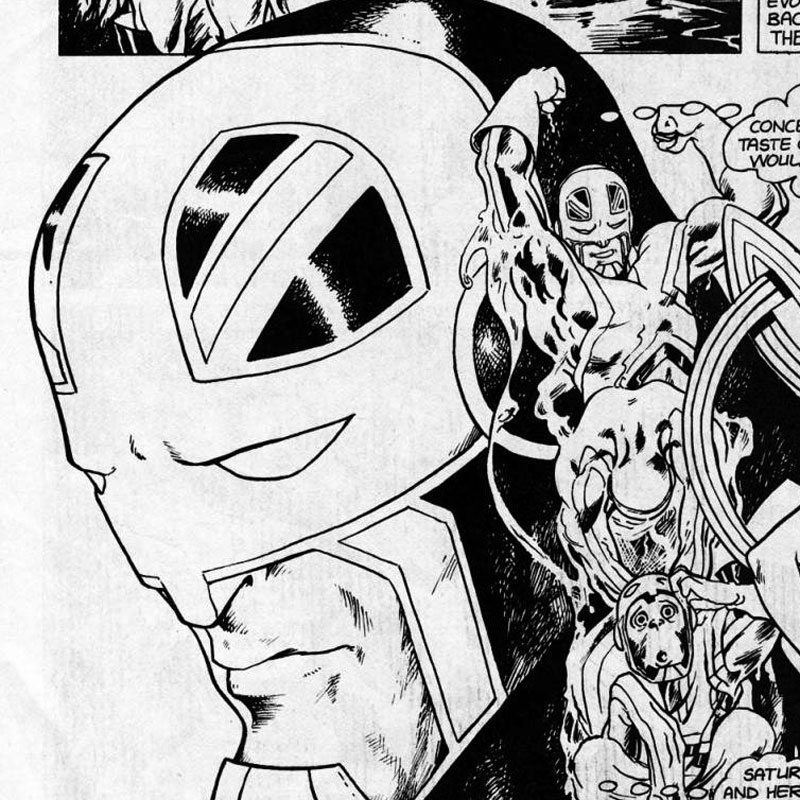
Thorpe reflected on Bernie Jaye’s predicament in his book and notes “I have no memory of knowing that at that time. If I’d known that our entire project was under threat I might have acted differently. “
Paul Neary is also quoted by Thorpe: “I used to skim the stories… but I don’t remember changing anything. Dave Thorpe was good, very imaginative.”
The story in question began In Marvel Super-Heroes issue 384, where we have a “prologue” entitled “Friends and Neighbours”. Captain Britain is in “Kirkdale” and we see a chap being attacked by fellow youths for being a “Crommie” as he visits a friend. Cap flies in to save him, and escapes from the stone throwers with both of them. Sharon explains to Cap as he rescues her and her boyfriend Jeff, that there are gangs per district, that they are at war, but as they land, the neighbours set out to attack Captain Britain.
Issue 385 has a fill in story, by Paul Neary, “Attack of the Binary Beings”.
Then we had Marvel Super-Heroes issue 386, David Thorpe’s last episode as a writer on “Captain Britain”, and we see that himself and Jackdaw resolve the issue amongst the quarrelling neighbourhoods, albeit using powers, and we the characters all peacefully non-consensually subdued and enjoying tea together.
This story, and, indeed, David Thorpe’s nine issues of “Captain Britain”, has always garnered much interest.
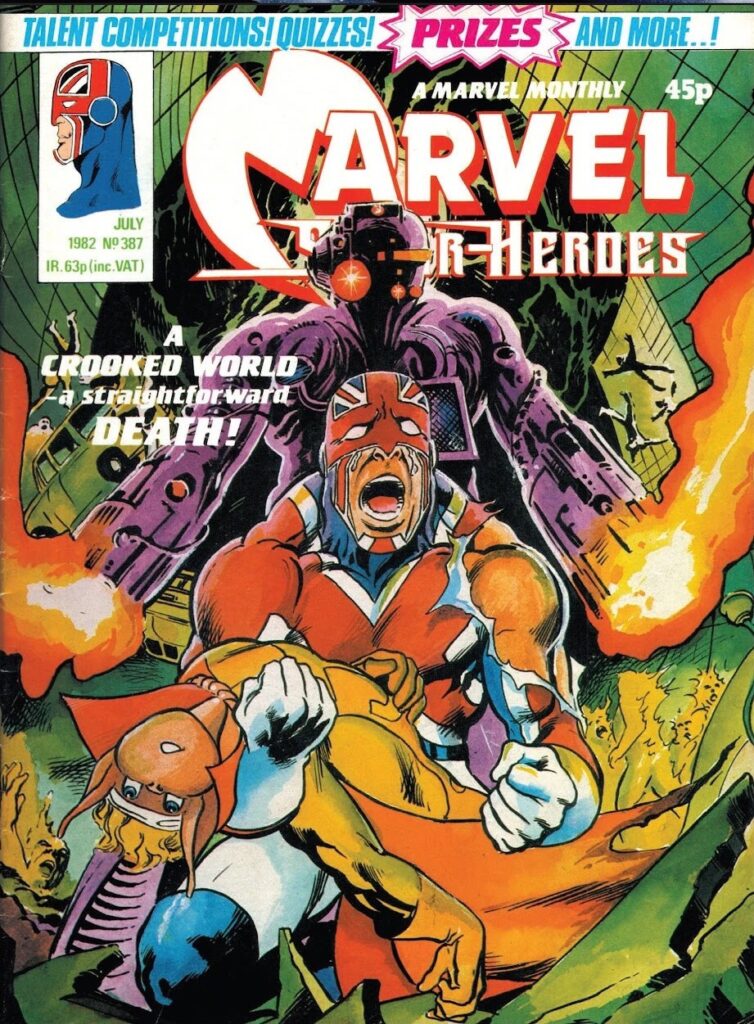
To replace David, Bernie Jaye sought out Alan Moore, who went on to write “Captain Britain”. In Speakeasy 91 he says: “I decided that what was needed was a superhero strip purely and simply, I thought that, whereas I could do politics in V for Vendetta, trying to combine serious politics with a character as gaudy as Captain Britain would probably be doomed to failure anyway and end up trivialising the issues. So as far as I was concerned, I wanted to do a very protechnic superhero adventure.
“…With Captain Britain, considering it’s already set in the Marvel Universe, there’s little point on trying to make it realistic,” he continued. “I decided to do a strip that would give Alan [Davis] plenty of chance to show off his drawing, and one where I could have fun.” How this progressed and developed is worthy of an article in its own right.
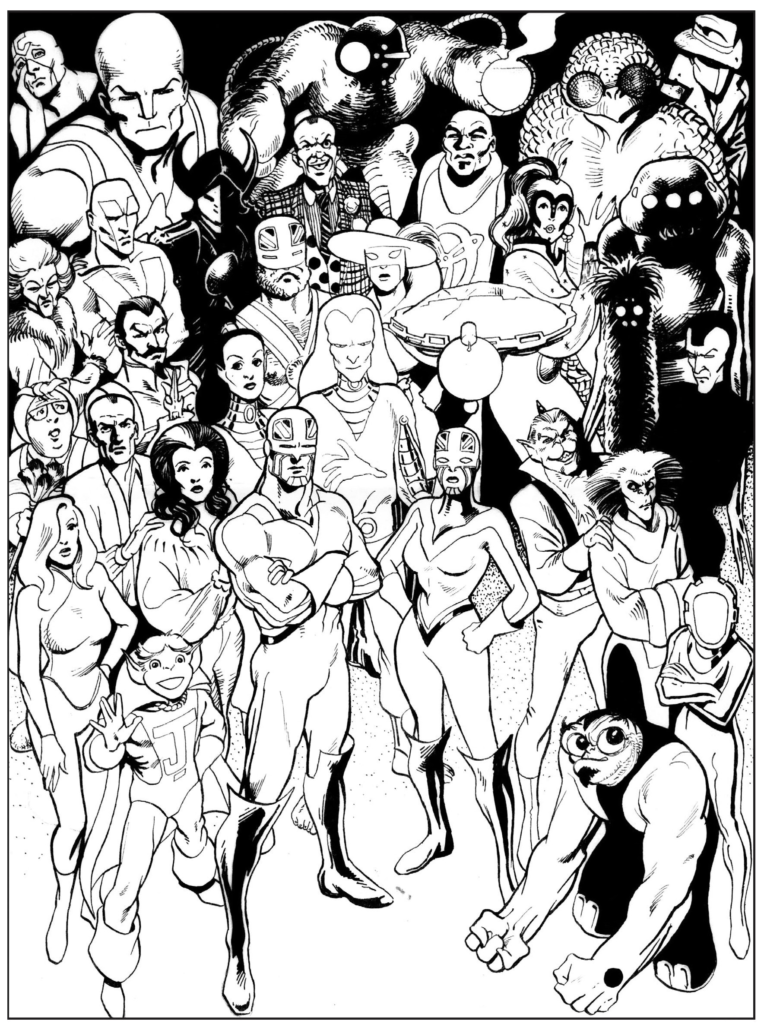
Iron Fist, also missing at Marvel UK?
Yet “Captain Britain” may not have been the only Marvel UK strip that was deliberately adjusted to remove reference to Northern Ireland.
At the end of 1981 and early 1982, there were quite a number of comics published by Marvel UK, catalogued as an amazing infographic by Michael Carroll, on Rusty Staples. Some of the titles included Conan, Epic, Savage Action Monthly, Marvel Super-Heroes, Blockbuster Monthly, Rampage Monthly, Super Spider-Man TV Comic, Future Tense, Captain America, Marvel Madhouse, a slew of pocket titles and licensed tie-ins such as Star Wars, Worzel Gummidge and Doctor Who Monthly.
Three comics are of distinct interest to us here: Blockbuster Monthly, Rampage Magazine and back to Marvel Super-Heroes. In the January 1982 cover dated Blockbuster #8 edited by Bernie Jaye, the issue sported the same cover as the US edition of Iron Fist #5, “When Slays the Scimitar”, published by Marvel UK’s parent in 1976.
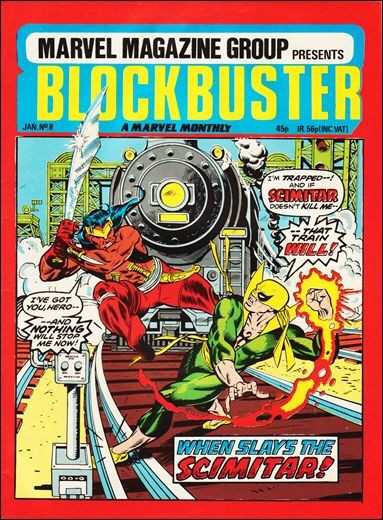
This Iron Fist story is written by Chris Claremont with art by John Byrne. Set in Paddington, London, which features on the cover, Danny Rand/ Iron Fist sees a man who’s being called a “traitor” as he is being attacked in an alleyway, and intervenes. Soon he is meeting the victim, who introduces himself as “Alan Cavanaugh”.
Alan explains that he was being attacked by “budding revolutionary terrorists. They want to be what I once was.” He introduces himself as
“Alan Cavanaugh. Provisional I.R.A. Freedom Fighter, Patriot. Terrorist. Bomber. Take yer pick – I was the best, dedicated. Loyal. Supremely careful. Uniti one day one of my bombs misfired.”
Cavanaugh continues as we close in on an obviously strained face in a fresh panel “I killed twelve people that day – women an’ children mostly, innocents, I was arrested – did time in Langkesh – but the British could never prove anything a’ they had to let me go… Leavin’ me with me memories. All those screams, all the pain. That’s when I realized that the people I was hurtin’ were the people I was fightin’ for. The innocents ones. That’s when I learned I’d had enough o’ killin’.”
Cavanaugh goes on to explain how he gave up fighting, but the police target him, as do the group that attacked him, “Walker’s mob”, neither of whom think he is finished with terrorism. Alan and Danny then get caught in a fire fight, as the Scimitar takes on Danny, and Alan gets injured protecting Iron Fist and bonding occurs. In issue #9 of Blockbuster we see Cavanaugh briefly seeing Danny off in a flight, a friendship has formed US edition of Iron Fist #6 was reprinted.
Bernie Jaye mentions in Marvel Super-Heroes 382 in the news column, that Rampage will now have “the favourite character from Blockbuster – Iron Fist!”
Rampage Magazine: X-Men Incorporating Blockbuster issue #45, cover dated March 1982, reprints Iron Fist #7, which got split over two issues, completing in Rampage #46. Rampage #47 and #48 reprinted issue #8 of Iron Fist and Rampage issue #49 and #50 reprinted Iron Fist issue #9 – so we briefly saw Alan Cavanaugh again.
Alan Cavanaugh is seen using papers to get on board a ship in London for New York, while two men watch on. One says to the other: “Yeah one bullet from me and he could be very dead too… why wait Pat? Let me kill the traitor here and now.” The plan is to wait until Cavanaugh gets to New York and the men then burn a picture of both him, and Iron Fist.
Marvel Rampage #50 says the next story is “Kung-Fu Killer” (from Iron Fist #10), and that tale appears in Marvel Super-Heroes #390.
But in Marvel Super-Heroes #391 we find that it is Issue #12 of Iron Fiist that is reprinted, despite #10 and #11 forming two parts of the story. Marvel Super-Heroes #392 reprints Iron Fist #13 “Target Iron Fist”, and we again see Alan Cavanaugh in this issue as he is attacked, as is Iron Fist.
By not publishing issue #11, a key Alan Cavanaugh sequence was not seen and read by fans. Was this another decision to remove something that was now deemed contentious?
Iron Fist issue #11, not reprinted in any of the Marvel UK title in 1982, saw us joining Alan Cavanaugh on the SS Balaclava bound for New York and Alan is having a nightmare,. The naration explains: “..in one man’s dreams the setting is Belfast, Northern Ireland and the time is Christmas week… The man is running a race, one he’s every night for the last few years.” We see Alan racing towards people and British Soldiers and shouting “Get out! For God’s Sake! Get out O’ the store… There’s a Bomb planted inside.”
We move to the third panel and we see him shouting “do you hear me, you fools! I said a Bomb!”…”NO!” and the explosion goes off and we see Alan Cavanaugh waking up. He is in a state of horrors and we then have an explanation. “His name’ Alan Cavenaugh and he used to be the best explovies man in the IRA… dependinging on your point of view, he’s a freedom fighter, a patriot, a soldier, a terrorist, a bomber.” while Alan remonstrates with himself, it is noted “The word Cavanbaugh uses though, is murderer.”
When we do rejoin Alan Cavanaugh in issue 12, he asks Iron Fist to meet him, but it is a trap set by IRA men, who remain unidentified throughout, although speak with what one might consider an Irish manner, “Holy Mother of Mercy” and so forth, and while Alan hopes for death, and is called a traitor, the story is assumed to be known, and so there is no mention of Northern Ireland or the IRA and a reader could well imagine that they are just criminals or gangsters.
Was this story gently sidelined? I have yet to ascertain this.
It is unclear whether the Captain Britain situation brought about an awareness that there was a sensitivity that would need to be complied with, that subsequently saw Alan Cavanaugh, who had appeared before the “Captain Britain” trouble as an IRA man,and then later have the Alan Cavanaugh back story “unpublished”, as one might say.
Bernie Jaye went on to edit The Daredevils and in 1984 received the Eagle Award for the comic, something that reminds us that many Marvel UK Publications such as Hulk Weekly and The Daredevils, as well as characters and stories created by UK creatives, were very good.
Bernie Jaye was immortalised somewhat when The Daredevils came to an end, Cobweb of the Special Executive bid her farewell and predicted great things. Despite what Alan Davis said about himself, there were no villains here, rather young people trying to make their way in the comic industry, trying their best, and doing their best.
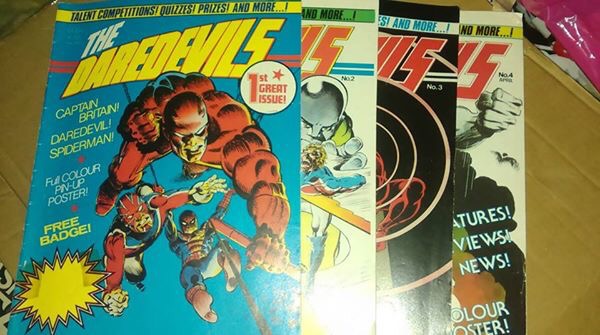
The relationships between the American and British Marvel Bullpens deserves consideration and I hope that in his forthcoming book, Marvel UK – From Cents to Pence, Rob Kirby will help us understand how the relationships worked, developed and, importantly, the dynamics that existed.
Contest of Champions #1 – Ignoring MUK Continuity
What we do know is that while Marvel Super-Heroes #386 came out in June 1982 it wasn’t the only Marvel release that month.
Dated June 1982, the Marvel US comic Marvel Super Hero Contest of Champions #1 introduced us to a new Irish character, Shamrock, and in her first panel is described “In Northern Ireland, a group of school children stare as their lives are saved from a terrorist bomb”…”An instant before their rescuer Shamrock disappears”. As all of Earth’s superheroes are gathered, we see a number of pages dedicated to greetings, friendships, commonalities and bonds reunited, except Shamrock, who looks over her shoulder and says “You wear the emblem of Great Britain” to which Captain Britain, wearing the old Claremont and Trimpe costume says “and you the green of Ireland” and we are left in no doubt on matters by the narration box, which states:
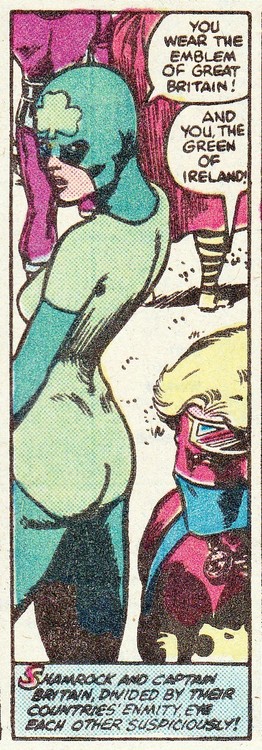
“Shamrock and Captain Britain, divided by their countries’ enmity, eye each other suspiciously…”.
The New York bullpen and Marvel US may have been blissfully unaware of the goings on in London. Was this something that would have been communicated? Was the writer, Mark Gruenwald, just not au fait with the contentious issue? Perhaps no-one updated John Romita Jr. and Bob Layton who drew the comic, unaware of recent changes in costume design for Captain Britain, totally different in both countries concurrently, the US comic using the old Trimpe version of Captain Britain? Was there no memo about curtailing politics, because this friction between the Irish and British heroes slips in, and is political, as is Shamrock’s debut. A school being bombed is portrayed as a non-trivial event, but perhaps it just wasn’t the same issue for New York as it was for London.
James Bacon
Corrections, confirmations and concurrences are very welcome, as are pints in a bar.
Thanks to
David Thorpe, Stuart Vandal, Michael Carroll, Vic Whittle, David McDonald, Robin Kirby, Rob Hansen, Steven Dean, Pádraig Ó Méalóid, Allison Hartman Adams, Will Morgan, Ian Hine at Dead Universe, Tom at Gosh, Luke at Comic Exchange, Colin Darragh at Dark Star
Captain Britain Omnibus
• Available here from AmazonUK (Affiliate Link)
ISBN: 978-1302932268
Follow the United Kingdom’s greatest champion from the streets of London to the mystic realm of Otherworld! Brian Braddock, hand-picked for greatness by the sorcerer Merlyn, has made the fateful choice between the sword of might and the amulet of right – and become a hero! Now, thrill to a complete collection of Captain Britain’s iconic UK adventures – from questing alongside the Black Knight, to battling Jim Jaspers and the Fury to prevent Earth from becoming a crooked world! But when Brian suffers a crisis of faith, will his sister Betsy inherit the mantle? Featuring the Special Executive, the Warpies, the Captain Britain Corps, Meggan and more!
Collecting: Material from Captain Britain (1976) 1-39; Super Spider-Man & Captain Britain (1977) 231-247; Hulk Comic (1979) 1, 3-46; Incredible Hulk Weekly (1980) 47-55, 57-63; Marvel Super-Heroes (1972) 377-388; Daredevils (1983) 1-11; Mighty World of Marvel (1983) 7-16; Captain Britain (1985) 1-14; Marvel Tales (1964) 131-133; Marvel Team-Up (1972) 65-66; New Mutants Annual (1984) 2; X-Men Annual (1970) 11
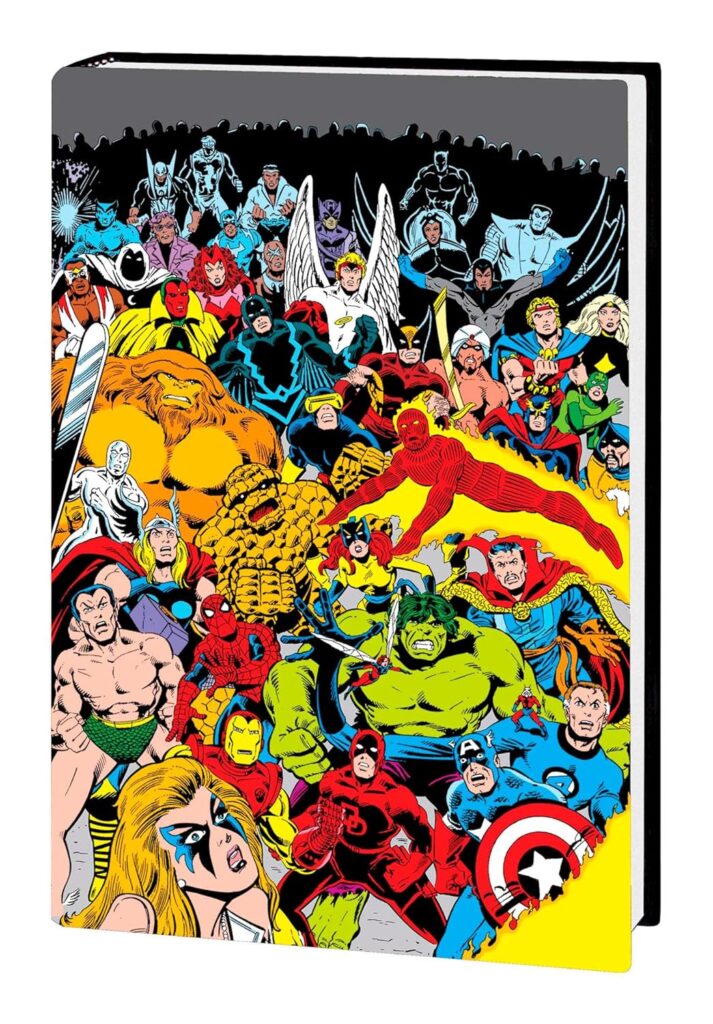
Marvel Super Hero Contest Of Champions Gallery Edition (Hardcover)
by Bill Mantlo, Mark Gruenwald, Steven Grant
• Availble here from AmazonUK (Affiliate Link)
The first ever Marvel event series is given the extra-sized treatment it deserves! When the Grandmaster plays a game of cosmic chess against Death herself, Earth’s super heroes become the pawns! If the Grandmaster wins, his brother the Collector will be restored to life. But if he loses, Death will claim a bitter price! Each side selects twelve champions from all across Earth to do battle for the fragments of the golden globe of life. But this clash of Marvel titans comes with unexpected twists and turns… and several surprising new combatants! Then, months later, the fallout of the contest leads to a life-and-death saga that pits two teams of Avengers against one another – and against a truly lethal Legion of the Unliving! Collecting: Marvel Super Hero Contest of Champions (1982) 1-3, West Coast Avengers Annual (1986) 2, Avengers Annual (1967) 16
Publications mentioned, referenced, quoted in this article
• Captain America #169 to #180
• Captain Britain Volume 1 #17
• Epic Illustrated #5
• Marvel Super-Heroes #377 to #392
• Blockbuster Monthly #8, #9
• Rampage #45 – #50
• Earth 616 by David Thorpe – reviewed here by James Bacon and on sale here (AmazonUK Affiliate Link)
• Speakeasy #47 January 1985 and Speakeasy #91 October 1988
• Amazing Heroes #85, 15th December 1985, interview by Les Chester
• Modern Masters, Volume 1: Alan Davis, April 2003, interview by Eric Nolen-Weathington (AmazonUK Affiliate ink)
This book, profusely illustrated with a deluxe sketchbook and gallery of rare and previously unpublished artwork, includes a tutorial by Davis on the artists that influenced him, as well as his views on graphic storytelling. Also included are interviews with long-time collaborators Paul Neary (who provides the Foreword) and Mark Farmer (who contributes the Afterword).
• Rob Kirby’s future book From Cents to Pence – Check out and follow A Distant Beacon, Rob’s web journal
• Michael Carroll’s Rusty Staples Marvel UK Timeline
• Lew Stringer has a lovely piece about conventions including te 1984
Birmingham Comic Art Show
• Steve Englehart interviewed by George Marston at Newsarama
Further Reading
• David Thorpe is online at davidthorpe.info
• Read our “Marvel UK: “Genesis ’92” – Looking Back and What Might Have Been” resource
That “Marvel Super Hero Contest of Champions” Costume Conundrum…
Following up on James post, Ian Sealy contacted downthetubes to comment regarding Contest of Champions…
“The reason Captain Britain appears in his original costume in Marvel Super Heroes Contest of Champions [in 1982] isn’t because the House of Ideas were unaware about what was going on at the Annex of Ideas,” he notes. “Instead, Contest of Champions was largely created in 1979, well before Alan Davis redesigned his costume in 1981.
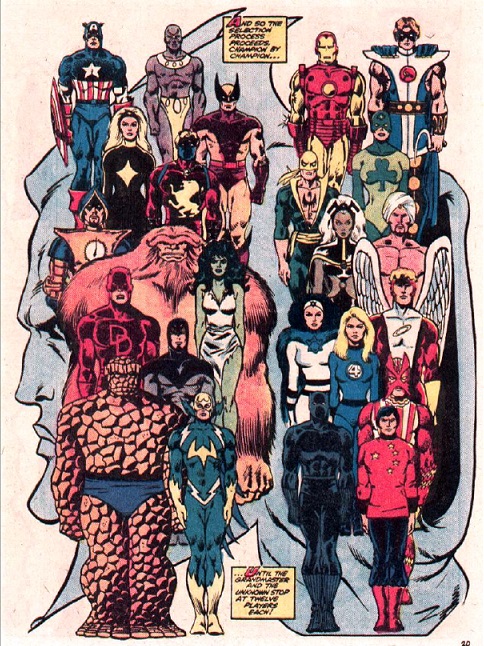
“It was intended to coincide with the 1980 Summer Olympics held in Moscow. Then, at the end of 1979, the USSR invaded Afghanistan and the US and other countries boycotted the Games.
“The comic was shelved, although Marvel Treasury Edition #25 was published, which tied in with the Winter Olympics held in the USA. Contest of Champions would have been in the same format, but a couple of years later, it was reworked into Marvel’s first ever limited series.
“That necessitated a number of changes to the story and art. For example, Ms. Marvel, who had lost her powers in 1981, was changed into She-Hulk. I guess changing Captain Britain’s costume wasn’t a high priority and that was left.”
Captain Britain is © Marvel Comics
James Bacon (he/him) is an Irish fan, a train driver living in London. A Hugo Award-winning editor of the fanzine “Journey Planet”, he is a comic fan and enjoys comic art, war Comics, Star Wars, Irish aspects to comics and railways in comics or otherwise. He has been writing about comics for over thirty years.
Categories: British Comics, Comics, Creating Comics, Features
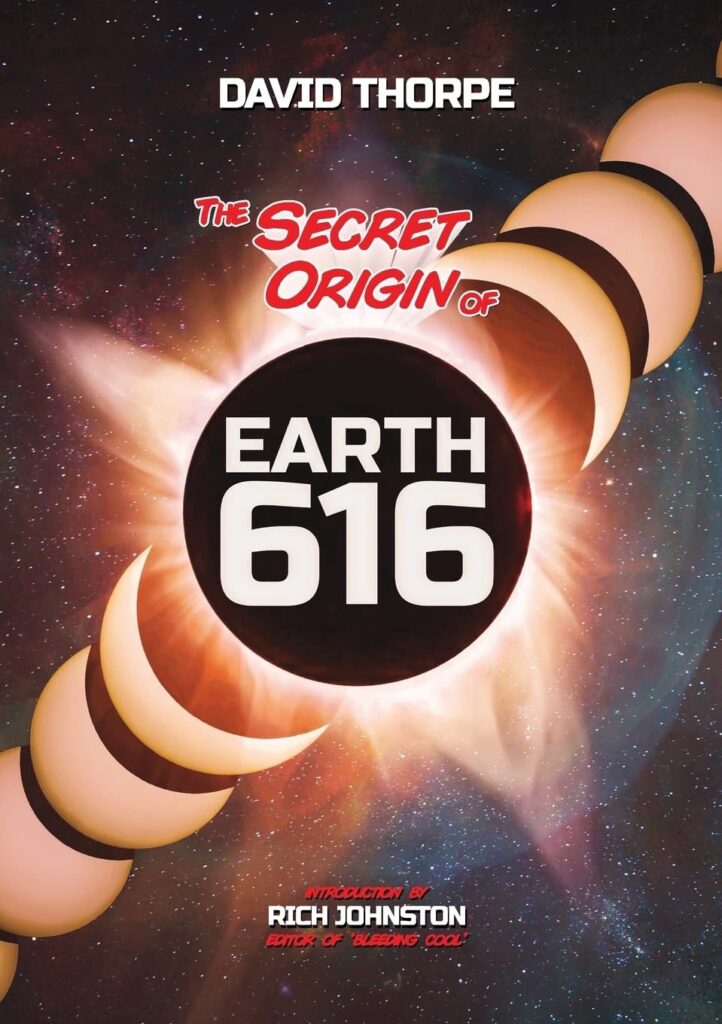
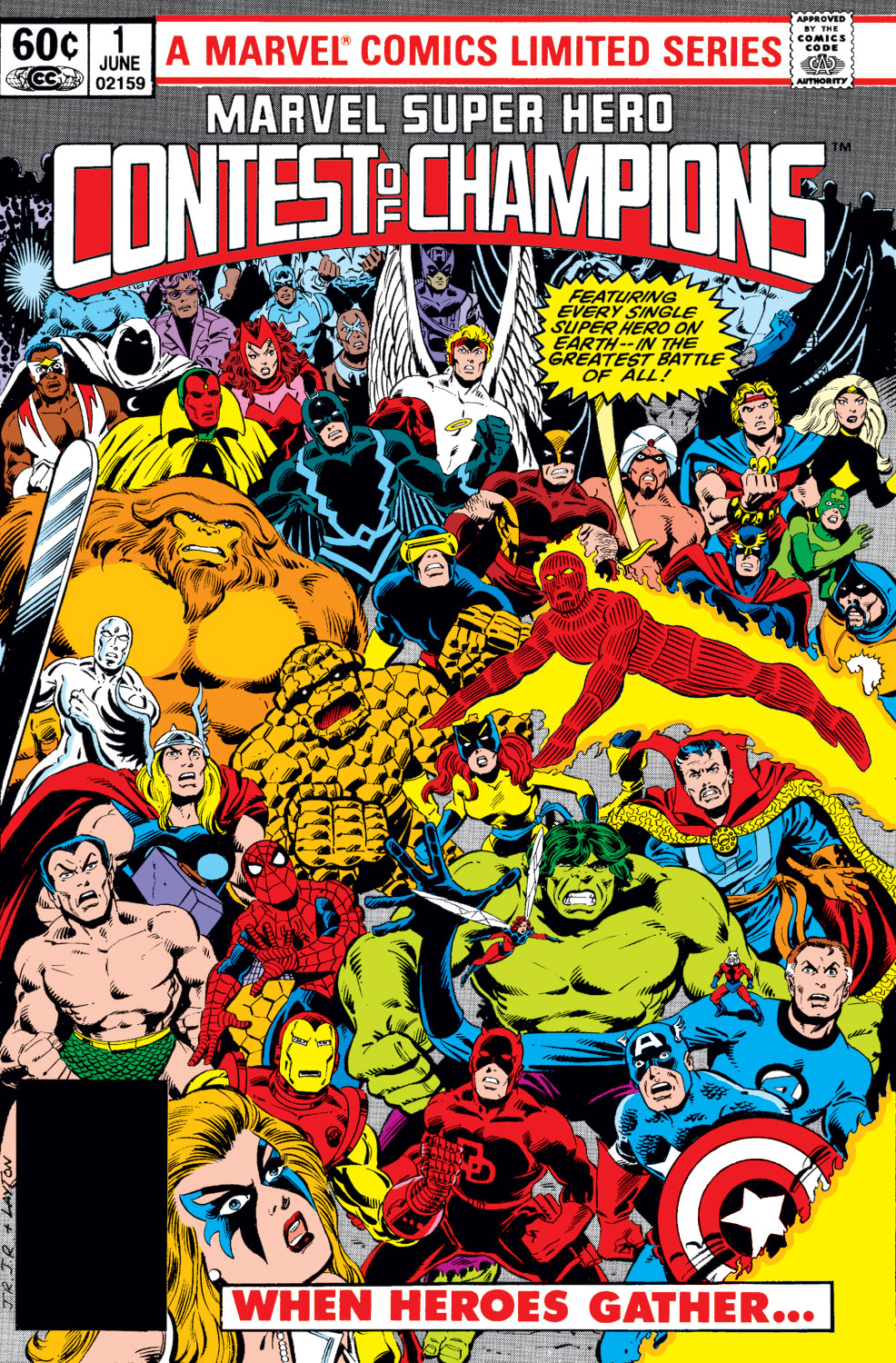
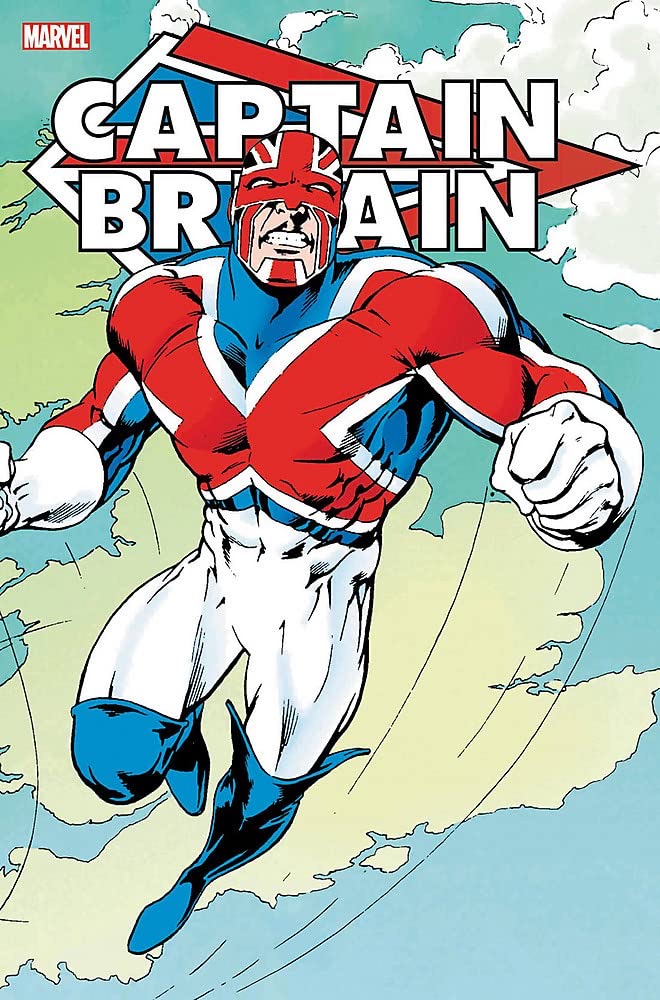
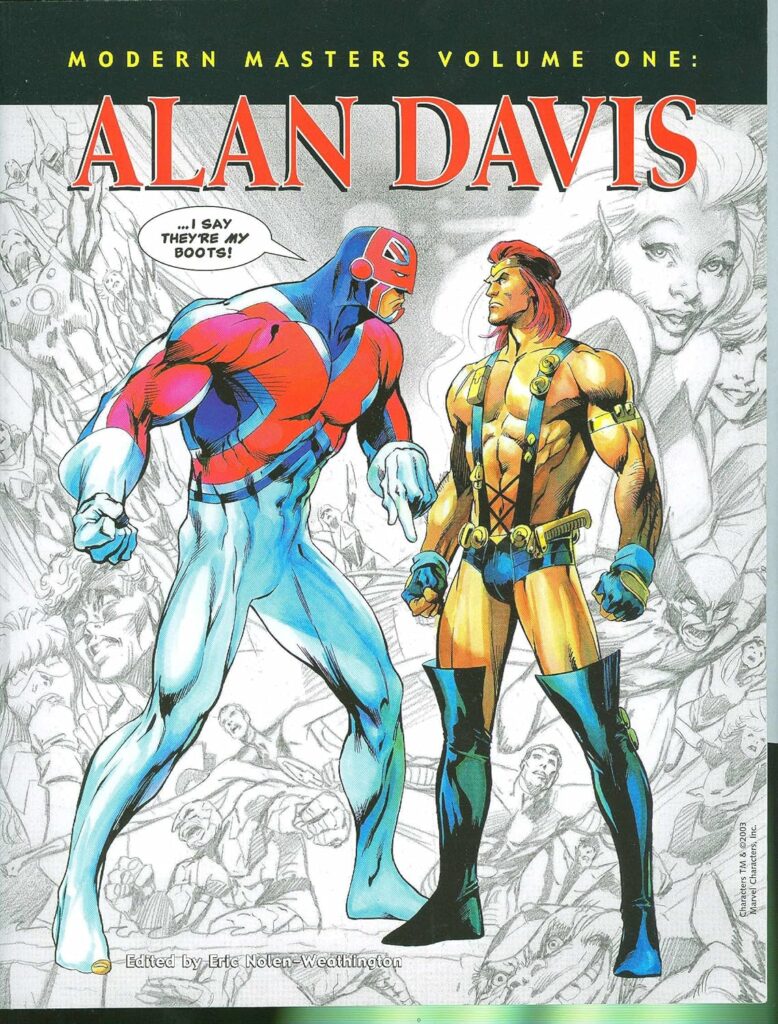
 Crowdfunding Spotlight: Who Killed Nessie? A Quick Chat with Paul Cornell & Rachael Smith
Crowdfunding Spotlight: Who Killed Nessie? A Quick Chat with Paul Cornell & Rachael Smith  Who remembers Jerry Siegel’s British superheroes,”Gadgetman and Gimmick-Kid”?
Who remembers Jerry Siegel’s British superheroes,”Gadgetman and Gimmick-Kid”?  Battle (and Action) – The Return: The Story So Far…..
Battle (and Action) – The Return: The Story So Far…..  Paul Neary – Hero Unlimited
Paul Neary – Hero Unlimited
Great thorough piece by James (as are all DTT pieces), one correction though; Alan Davis is a second generation Irish, both his parents emigrated from Ireland and many of his relatives are Irish. Growing up in the UK in the Seventies, he would have been acutely aware of anti-Irish bigotry, IIRC Alan wouldn’t have anything in common with the ‘Orange Community’. The issues Alan had were with Thorpe’s trite treatment of a complex sensitive sectarian issue (illuminated by Thorpe’s explanation of the Corby Orange Community being the reason Davis refused to draw it). Simply put, Davis believed Thorpe lacked the ability to tackle ‘The Troubles’ and he didn’t wish to contribute to his failings.
I remember reading the Thorpe run when it first came out. I never made the connection with Northern Ireland. I was probably blinded by the reference to the story taking place in Kirkdale – an area of Liverpool just a mile or two away from where I lived.